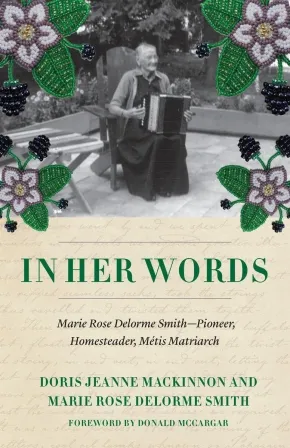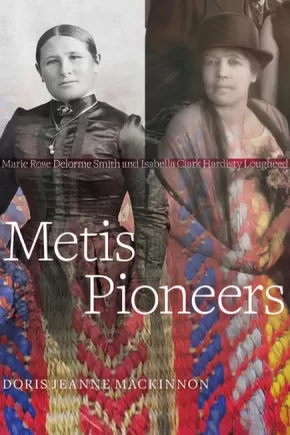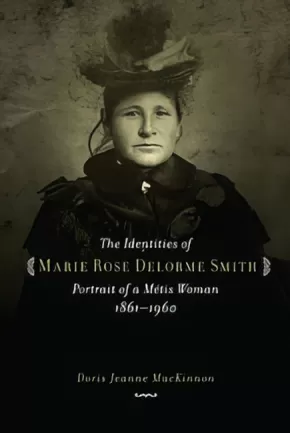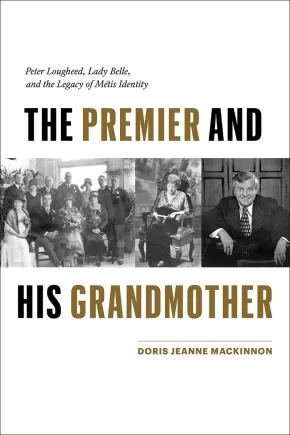Doris Jeanne Mackinnon
Doris Jeanne MacKinnon was born on a farm in northeastern Alberta and attended school in the historic town of St-Paul-des-Métis. She has a PhD in Indigenous and post-Confederation Canadian history. An independent researcher and postsecondary instructor, she lives in Red Deer, Alberta.
Books (4)
Synopsis:
Part historical biography, part compilation of the written works of Mary Rose Delorme Smith (1861–1960), a prolific and accomplished Métis woman.
Born into a prominent fur-trading family and remembered as a community builder and rancher, Marie Rose Delorme Smith (1861–1960) is seldom recognized as a writer and chronicler of Métis and Prairie history. Fluent in French, English, and likely Michif, Delorme Smith recorded a wealth of written records and stories throughout her long life, in the form of letters, published articles, unpublished manuscripts, and personal documents.
Donated to public archives following her death, these written works garnered some interest among scholars and biographers over the years, as prominent Indigenous women gradually found a place in the histories they had been left out of for generations. Delorme Smith became the subject of biographies and scholarly research, and she was finally recognized as a “National Historic Person” by the Canadian government in 2022. However, the recognition bestowed upon her rarely highlighted her own words, which reveal so much about her life, Métis history, and Prairie life in the late nineteenth and early twentieth centuries.
For the first time, historian and biographer Doris Jeanne MacKinnon presents an extensive array of Delorme Smith’s writings, preserved verbatim, and puts them in historical and social context. This fascinating collection of documents from a bygone era reveals the strength, intellect, and leadership of a fascinating Métis martriarch.
Additional Information
276 pages | 5.50" x 8.50" | b&w photographs | Paperback
Synopsis:
In Métis Pioneers, Doris Jeanne MacKinnon compares the survival strategies of two Métis women born during the fur trade—one from the French-speaking free trade tradition and one from the English-speaking Hudson’s Bay Company tradition—who settled in southern Alberta as the Canadian West transitioned to a sedentary agricultural and industrial economy. MacKinnon provides rare insight into their lives, demonstrating the contributions Métis women made to the building of the Prairie West. This is a compelling tale of two women’s acts of quiet resistance in the final days of the British Empire.
Reviews
"[These two women's] individual paths provide interesting parallel stories about Métis women who survived and thrived as the Canadian west transitioned from the fur trade to a more sedentary agricultural economy. Marie Rose’s family was French-speaking Métis and a few served as Louis Riel’s soldiers. Isabella was from the English-speaking Métis stock. Both were born in 1861 and both married non-Indigenous men in unions that were influenced, or arranged outright, by their families. Both families had a strong history in the fur trade; Marie Rose’s were free traders and Isabella as part of the Hudson’s Bay Company. Both were community builders who later relied on their influence and circle of acquaintances for support after they became widows and fell on hard times. And the stories of both women showed how the Métis people continued to make significant contributions to the Canadian west even after the fur trade ended, an area of historical study that MacKinnon thinks is rife for discovery...." — Eric Volmers, Calgary Herald
"MacKinnon's book offers readers an in-depth look at the contributions each of the two women made to the growth of Canada's west, but more than that, it is a book about courage, resilience, determination and strength of character. The book was written to tell the truth..." — John Copley, Alberta Native News
"Whether or not the two women were ever in the same room together, their individual paths provide interesting parallel stories about Métis women who survived and thrived as the Canadian west transitioned from the fur trade to a more sedentary agricultural economy…And the stories of both women showed how the Métis people continued to make significant contributions to the Canadian west even after the fur trade ended, an area of historical study that MacKinnon thinks is rife for discovery."— Eric Volmers, Strength and Resilience
"This book deals with the lives of two frontier women - Isabella Lougheed and Marie Rose Smith. They both were Métis but their histories were miles apart. ... The author has found a rich source of history in these two women and offers them in a detailed account of their lives." — Alberta History
Additional Information
584 pages | 6.00" x 9.00"
Synopsis:
This book relates the history and self-identifying process of a Métis woman who lived on the western plains of Canada during the transitional period from fur trade to sedentary agricultural economy.
Marie Rose Delorme Smith was a woman of French-Métis ancestry who was born during the fur trade era and who spent her adult years as a pioneer rancher in the Pincher Creek district of southern Alberta. Sold by her mother at the age of sixteen to a robe and whiskey trader several years older than her, Marie Rose went on to raise seventeen children, establish a boarding house, take a homestead, serve as medicine woman and midwife, and to publish several articles in the early prairie ranch periodical, Canadian Cattlemen. The author relies on close readings of these articles, as well as the diaries, manuscripts, and fictional writing of Marie Rose Delorme Smith, along with personal interviews with her descendants. These sources allow a close examination of the self-identifying process for Marie Rose as she negotiated the changing environment of the western plains during the late 1800s and early 1900s when large numbers of Anglo-speaking immigrants settled in the area.
Clearly proud of her Métis identity, Marie Rose was a member of an extended family who served as Louis Riel’s soldiers, and she presented that identity tentatively in her own writings. Roles which Marie Rose assumed with pride were those of author, historian, mother, and historical character, and these roles serve as themes from which to examine her life.
Synopsis:
An intriguing look at the connections between Alberta premier Peter Lougheed and his Métis grandmother, Isabella Clarke Hardisty Lougheed, exploring how Métis identity, political activism, and colonial institutional power shaped the lives and legacies of both.
Combining the approaches of political biography and historical narrative, The Premier and His Grandmother introduces readers to two compelling and complex public figures. Born into a prominent fur trading family, Isabella Clarke Hardisty Lougheed (1861–1936) established a distinct role for herself as an influential Métis woman in southern Alberta, at a time when racial boundaries in the province were hardening and Métis activists established a firm foundation for the Métis to be recognized as distinct Indigenous Peoples.
Isabella’s grandson Edgar Peter Lougheed (1928–2021) served as premier of Alberta at a time when some of that activism achieved both successes and losses. Drawing on Peter Lougheed’s personal papers, family interviews, and archival research, this book analyzes his political initiatives in the context of his own identity as a person of Métis ancestry. While there are several publications that refer to Peter Lougheed in the context of his role as premier, few of those publications have acknowledged his connection to an important Métis pioneer family and his connection to his Indigenous ancestors.
Additional Information
320 pages | 6.00" x 9.00" | b&w photographs | Paperback










